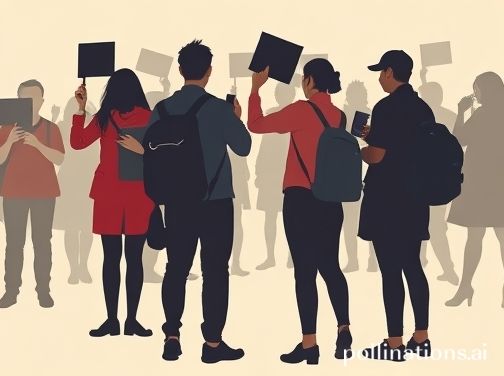Taiwanese Students to Protest Ministry of Education's Mobile Device Guidelines
Students Voice Concerns Over Top-Down Approach and Call for Greater Inclusion in Policy Making

Taipei, May 22 – Students from multiple senior high schools across Taiwan are organizing a protest scheduled for Saturday outside the Ministry of Education (MOE), to express their dissatisfaction with the ministry's draft guidelines regarding the management of mobile device usage in schools.
A student representative, speaking to CNA, cited concerns over the MOE's "top-down" approach, specifically highlighting the lack of student involvement in the policy's development.
The students are urging the MOE to withdraw the current guidelines and to incorporate broader public input, including public debates and hearings, in the creation of a new policy. The current guidelines were published on a government-run platform on May 21 to collect public feedback, aiming to assist schools in managing student use of smartphones, tablets, and other mobile devices on campus.
The guidelines suggest that elementary and junior high schools should collectively store or individually hold the mobile devices brought by students. For senior high schools, the guidelines propose schools should hold meetings with teachers, parents, and student representatives to develop a unified management system.
Despite the guidelines mentioning student inclusion in discussions, protestors fear decisions might still be overridden by school affairs meetings.
The draft guidelines have already generated mixed reactions, with public feedback open on the platform until June 1.
The planned protest, organized by two student coalitions, involves schools such as Nangang Senior High School and Dazhi High School in Taipei, as well as Banqiao Senior High School and Zhonghe Senior High School in New Taipei.
Earlier on Thursday, representatives from NGOs, including EdYouth, held a press conference appealing to the MOE to "uphold campus democracy by including students in decision-making." Several lawmakers from the ruling Democratic Progressive Party (DPP) were present at the event in support of the students.
According to DPP Legislator Wu Pei-yi (吳沛憶), the mobile device management policy is not only about controlling device usage but also about campus democracy, procedural justice, and recognizing students as active participants in their education. Wu further emphasized that incorporating students in policy discussions can cultivate greater self-discipline and reduce conflicts, urging the MOE to value "listening to students."
Other Versions
Estudiantes taiwaneses protestan contra las directrices del Ministerio de Educación sobre dispositivos móviles
Des étudiants taïwanais protestent contre les directives du ministère de l'éducation sur les appareils mobiles
Mahasiswa Taiwan akan Memprotes Pedoman Perangkat Seluler Kementerian Pendidikan
Gli studenti taiwanesi protestano contro le linee guida del Ministero dell'Istruzione per i dispositivi mobili
台湾の学生、文部科学省の携帯端末ガイドラインに抗議へ
대만 학생들, 교육부의 모바일 기기 가이드라인에 항의하다
Mga Estudyanteng Taiwanese Magpoprotesta sa mga Patnubay ng Ministry of Education Tungkol sa Mobile Device
Тайваньские студенты протестуют против правил использования мобильных устройств, принятых Министерством образования
นักเรียนไต้หวันประท้วงแนวทางการใช้อุปกรณ์พกพาของกระทรวงศึกษาธิการ
Sinh viên Đài Loan phản đối Hướng dẫn về Thiết bị Di động của Bộ Giáo dục

